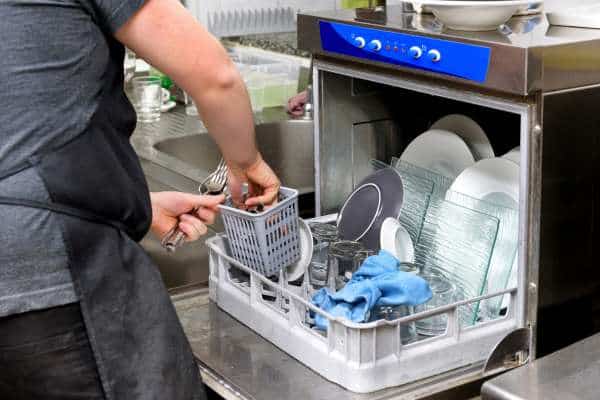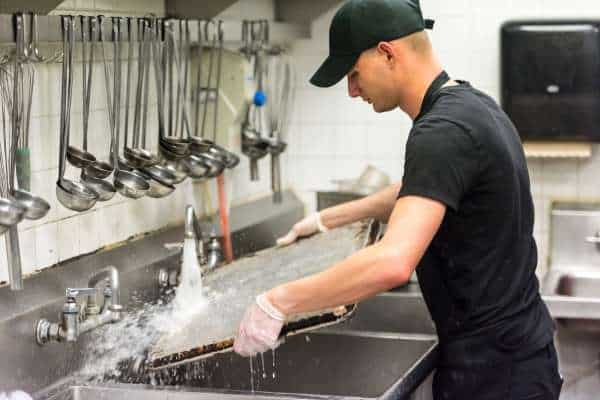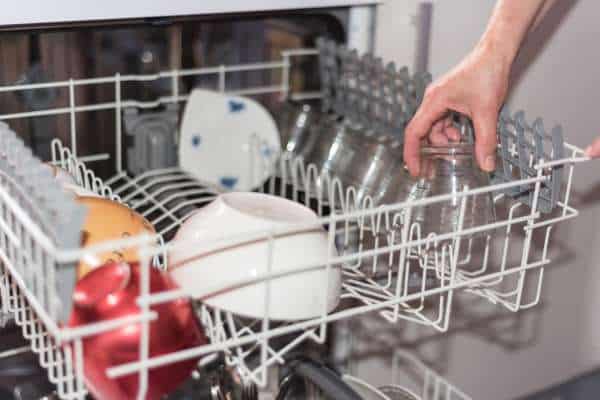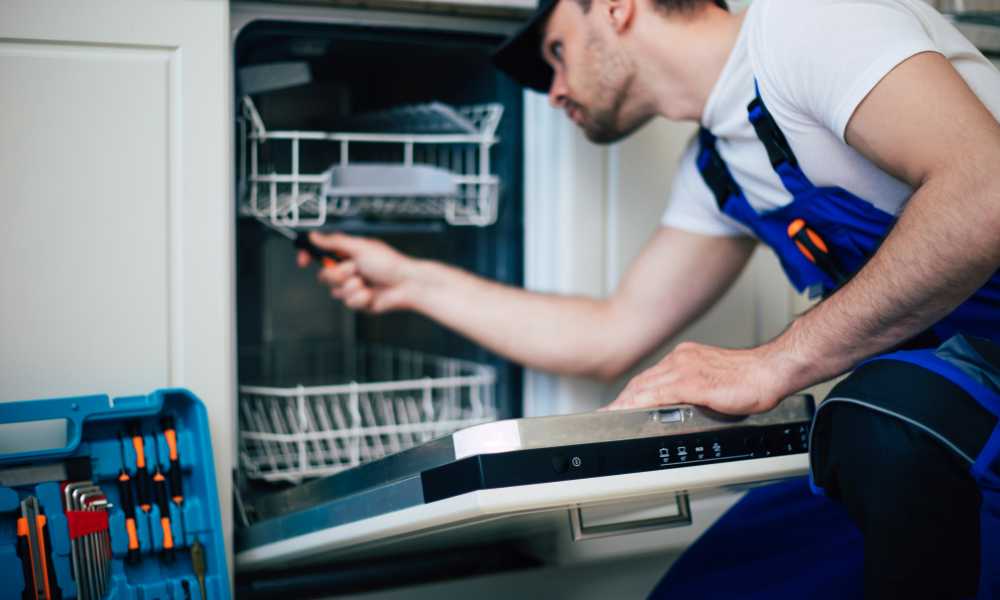If you’re asking, “Why is my Dishwasher Leaking”, you’re likely dealing with a frustrating problem that can cause water damage and disrupt your kitchen routine. A leaking dishwasher is not only inconvenient but can also lead to costly repairs if left unaddressed. The cause of the leak could be anything from a damaged door seal to a faulty pump or hose. In this article, we’ll explore the most common reasons why your dishwasher might be leaking and provide practical solutions to fix the issue. By identifying the root cause early, you can save time, money, and prevent further damage to your appliance and home.
Understanding the Basics of Dishwasher Operation

When trying to answer “Why is my Dishwasher Leaking?”, it’s important to first understand how dishwashers operate. Dishwashers use water to clean dishes by spraying it over them, followed by draining the water out through the drainage system. Water enters through the inlet valve, then circulates via spray arms to clean the dishes. Once the cycle completes, the water is drained through a pump and hose. Understanding these components—such as the spray arms, pump, hoses, and seals—can help identify the potential causes of leaks. Familiarity with these basics ensures a better approach to troubleshooting and fixing dishwasher leaks efficiently.
Door Seal Issues
One of the most common reasons for a dishwasher leak is a worn or damaged door seal. The door seal, also known as the gasket, creates a tight barrier to prevent water from escaping during the washing cycle. Over time, the seal can become brittle, cracked, or dislodged, allowing water to leak out. To inspect the door seal, check for visible signs of wear or tears along the edges of the door. If damaged, replacing the door gasket is a simple yet effective solution. You can purchase a replacement seal online or at a local store, and it’s easy to install by simply snapping it into place.
Loose or Damaged Hoses

Loose or damaged hoses are a common cause of dishwasher leaks. Over time, hoses can become loose, cracked, or deteriorated due to constant water pressure and wear. These issues can result in water leaking from connections, leading to puddles around your dishwasher. To address this, start by inspecting the hoses for any visible damage, cracks, or leaks. Check all hose connections to ensure they are secure and tightly fastened. If any hoses appear damaged or show signs of wear, they should be replaced immediately. Tightening loose connections or replacing faulty hoses can help prevent further leakage and ensure your dishwasher functions properly.
Faulty Water Inlet Valve
The water inlet valve controls the flow of water into your dishwasher, ensuring the right amount enters during each cycle. If the valve becomes faulty, it may cause leaks by allowing water to escape or not shutting off properly. Common symptoms of a malfunctioning water inlet valve include water continuously running into the dishwasher, puddles forming underneath the appliance, or irregular water flow during washing. To test the valve, first disconnect the power and water supply. Use a multimeter to check for continuity. If there is no continuity, the valve is defective and should be replaced with a new one to stop the leak and restore proper function.
Misaligned or Blocked Dishwasher Filter

A misaligned or blocked dishwasher filter can often be the culprit behind leaks. The filter plays a crucial role in trapping food particles and debris, preventing them from clogging the drain and ensuring smooth water flow. When the filter becomes clogged or misaligned, it can cause water to spill out, leading to leaks. To prevent this, regularly clean the filter by removing it from its housing, rinsing off debris, and checking for any blockages. If the filter is misaligned, carefully realign it to fit properly. By maintaining a clean and properly positioned filter, you can avoid leaks and ensure your dishwasher operates efficiently.
Overuse of Detergent
Overuse of detergent is a common cause of dishwasher leaks. When too much detergent is used, it creates excessive suds that can overflow and leak from the Dish cleaning machine door. These suds can also cause the dishwasher to malfunction, preventing it from draining properly. To avoid this, always follow the manufacturer’s recommendations for detergent quantity. Most dishwashers work efficiently with a small amount of detergent, and using too much can actually leave residue on your dishes. If you’ve been using more detergent than necessary, reduce the amount and monitor your Dish cleaning machine for any improvements in performance and leakage.
Incorrect Dishwasher Loading

Improper loading or overloading your dishwasher can lead to water spilling out, causing leaks. When the Dish cleaning machine is overcrowded, water may not reach all the dishes evenly, leading to poor washing results and excessive water buildup. Additionally, poorly positioned items can block the door seal or spray arms, allowing water to escape. To avoid leaks, always load your Dish cleaning machine according to the manufacturer’s instructions. Place larger items, such as pots and pans, on the bottom rack, ensuring they don’t block the spray arms. Arrange dishes so aqua can circulate freely, and avoid overcrowding the racks. Proper loading ensures optimal cleaning and prevents aqua from leaking.
Pump Seal Problems
A worn-out pump seal is a common reason for a dishwasher leaking. The pump seal plays a critical role in keeping water inside the unit during the washing and draining cycles. If the seal becomes cracked, damaged, or worn, water can escape from the Dish cleaning machine , leading to leaks. To identify a faulty pump seal, check for visible cracks or signs of wear around the pump area. If you notice aqua pooling under the Dish cleaning machine , this could indicate a damaged seal. Replacing the pump seal is a relatively simple process that involves removing the dishwasher’s lower panel and installing a new seal. This fix can prevent further leakage and improve performance.
High Water Pressure Issues
High water pressure can be a hidden culprit behind your Dish cleaning machine leaking. When the water pressure is too high, it can cause the seals, hoses, and gaskets to wear out more quickly, leading to leaks. Excessive pressure forces aqua through parts of the Dish cleaning machine that aren’t designed to handle it, resulting in overflow or broken seals. To prevent this, it’s essential to have a pressure regulator installed to control the water flow. Checking and adjusting the aqua pressure settings in your home can help maintain optimal Dish cleaning machine function. If you suspect high aqua pressure, it’s best to consult a plumber to ensure proper adjustment and avoid future leaks.
Checking for Cracks in the Dishwasher Tub

A cracked dishwasher tub is one of the more serious causes of leakage. Even a small crack can allow aqua to escape during the wash cycle, leading to puddles on the kitchen floor. To check for cracks, carefully inspect the interior of the tub, paying special attention to the corners and bottom. Use a flashlight to look for any visible damage. If you find cracks, the tub may need to be replaced, as repair options are limited. In some cases, professional repair or replacement is necessary to prevent further aqua damage and restore your dishwasher’s efficiency. Regular maintenance can also help catch cracks early before they cause leaks.
Conclusion
If you’re wondering, “Why is my Dishwasher Leaking?”, it could be due to several common issues like a damaged door seal, cracked tub, or faulty hoses. Identifying the root cause is essential to fixing the problem quickly and preventing further damage to your kitchen. Regular maintenance, such as cleaning filters and inspecting hoses, can help avoid many leaks. However, more complex issues, like a cracked tub or malfunctioning pump, may require professional attention. By following the troubleshooting tips in this article, you can get your Dish cleaning machine back to peak performance and protect your home from costly aqua damage.

